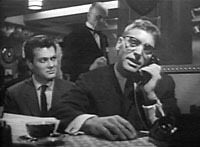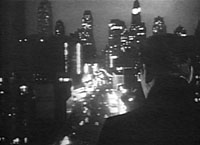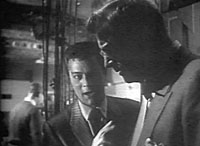Mackendrick was, oddly enough, a Britisher, whose great success at legendary Ealing Studios, with shy, ironic comedies like The Man In The White Suit and Tight Little Island (Whisky Galore) gave no portent of the astonishing bitterness of Sweet Smell of Success. Screenwriters Ernest Lehman and Clifford Odets provided Mackendrick with a uniquely American type of villain, the sanctimonious gossip-monger who could shoot down a career from a corner table at "21."
 Although the film was most clearly based on the world of Ed Sullivan, Sweet Smell of Success' "J.J. Hunsecker" (Burt Lancaster) is a composite of a half-dozen columnists on the Broadway beat. As television turned New York's newspaper circulation wars into death grapples, desperate editors allowed more and more innuendo and invention to seep into print. Soon, columnists such as Sullivan and Walter Winchell outgrew simple celebrity-stalking to become hysterical voices for `100% Americanism'. Lehman and Odet's script is a brave, explicit indictment of witchhunting in all media.
Although the film was most clearly based on the world of Ed Sullivan, Sweet Smell of Success' "J.J. Hunsecker" (Burt Lancaster) is a composite of a half-dozen columnists on the Broadway beat. As television turned New York's newspaper circulation wars into death grapples, desperate editors allowed more and more innuendo and invention to seep into print. Soon, columnists such as Sullivan and Walter Winchell outgrew simple celebrity-stalking to become hysterical voices for `100% Americanism'. Lehman and Odet's script is a brave, explicit indictment of witchhunting in all media.
Lehman and Odets also gave Mackendrick an even greater gift. Sweet Smell of Success has its own agate-type poetry, as the characters speak in the hyperbolic, not-really-very-funny language of the columns themselves. Like Cockney rhyming slang, the columnist's argot can be understood only by the initiate. Lehman, Odets, and Mackendrick dutifully see to it that we are immersed in a columnist's underworld of swank nightclubs, walk-up offices at the fringes of the theatre district, and cramped, dingy jazz hangouts.
 Even the character and bit performances in Sweet Smell of Success are, like smoking manhole covers, precisely New York, and grotesquely picturesque; they are one part Damon Runyon, two parts Hubert Selby. There is Emile Meyer's gruesome cop, Kello, screeching down a deserted avenue to mock Falco: "C'mere, Sidney, I wanna chastise ya!"; cigarette girl Barbara Nichols forcing herself into "that tropical island kinda mood" for one of J.J.'s oily competitors; hapless secretary Jeff Donnell mooning over and lying for the seedy Falco; veteran character actor Sam Levene as a beleaguered agent begging Falco and J.J. for his young client's job and life back. The gargoyles and broken spirits who populate what Sidney calls "my bilious private life" make Sweet Smell of Success a gallery of urban despair.
Even the character and bit performances in Sweet Smell of Success are, like smoking manhole covers, precisely New York, and grotesquely picturesque; they are one part Damon Runyon, two parts Hubert Selby. There is Emile Meyer's gruesome cop, Kello, screeching down a deserted avenue to mock Falco: "C'mere, Sidney, I wanna chastise ya!"; cigarette girl Barbara Nichols forcing herself into "that tropical island kinda mood" for one of J.J.'s oily competitors; hapless secretary Jeff Donnell mooning over and lying for the seedy Falco; veteran character actor Sam Levene as a beleaguered agent begging Falco and J.J. for his young client's job and life back. The gargoyles and broken spirits who populate what Sidney calls "my bilious private life" make Sweet Smell of Success a gallery of urban despair.
Through New York's chill night streets, collar turned up against the cold of his own heart, stalks the restless, relentless Falco, played by Curtis in what is undeniably his greatest performance. As indigestible as a Broadway hot dog, Sidney is a former poolhall gopher, and in Curtis' best up-from-Brooklyn manner, is determined to do whatever it takes not to ever have to hunt up a pack of butts for another hustler again. But Curtis' Falco is no mere rogue. He is an assassin's handyman, forging the knives that will slice up a young musician (Martin Milner) and helpfully passing them to the reptilian J.J. Hunsecker.
 Hunsecker looms over the film's New York like the Grim Reaper, reaching out to crush the unsuspecting and promote the undeserving. Lancaster, along with agent Harold Hecht, produced the film, but he elected to hide his well-known physical energy -- he had been an acrobat in a WPA circus in the 1930's, and had just finished several swashbucklers -- behind steel-rimmed glasses and an equally steely, hulking, deliberate performance style. J.J.'s low tones and mortician's mien shroud a warped love for his sister, whom he has trapped with him in his inaccessible penthouse apartment, seemingly for life; less easily masked is his sadism. "I love this dirty town," says J.J. with genuine adoration, looking down at his beloved New York from on high. And on those days when New York City turns its bitterest face toward the young and the idealistic, the man and the city deserve each other.
Hunsecker looms over the film's New York like the Grim Reaper, reaching out to crush the unsuspecting and promote the undeserving. Lancaster, along with agent Harold Hecht, produced the film, but he elected to hide his well-known physical energy -- he had been an acrobat in a WPA circus in the 1930's, and had just finished several swashbucklers -- behind steel-rimmed glasses and an equally steely, hulking, deliberate performance style. J.J.'s low tones and mortician's mien shroud a warped love for his sister, whom he has trapped with him in his inaccessible penthouse apartment, seemingly for life; less easily masked is his sadism. "I love this dirty town," says J.J. with genuine adoration, looking down at his beloved New York from on high. And on those days when New York City turns its bitterest face toward the young and the idealistic, the man and the city deserve each other.
By turns shrill and tragic, Sweet Smell of Success pulsates with Elmer Bernstein's discordant, jazzy score, which sends shrieking trumpets up dead-end alleys after characters, and throbs deep bass ostinatos under scenes of agonized internal conflict. Even when Chico Hamilton's experimental jazz quartet takes a confident, thoughtful turn in the Elysian Room, it plays against the tense background of Sidney's Byzantine cloakroom intriguing.
In this grifter's ode, the smell of success is acrid, and burns in the nostrils long after Times Square's marquee lights go off in the frozen Sunday dawn.




